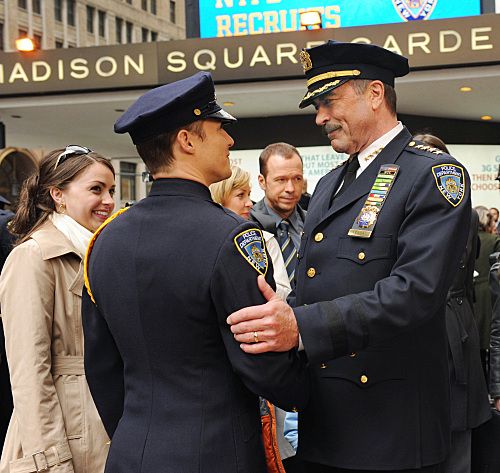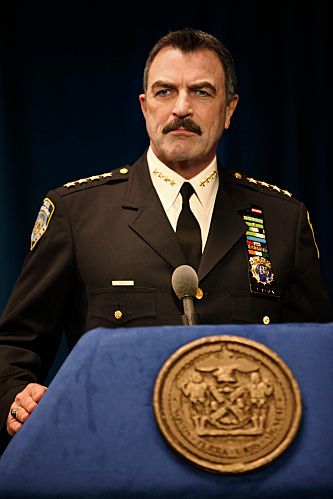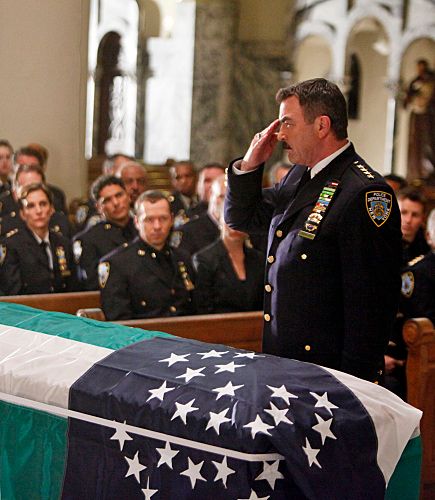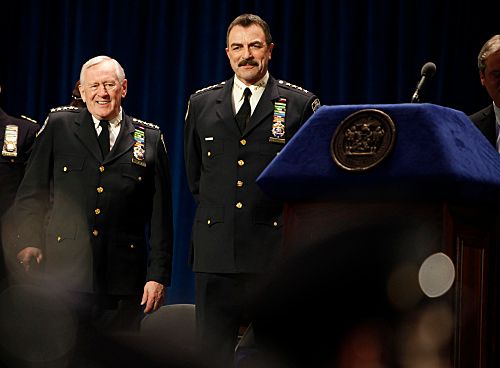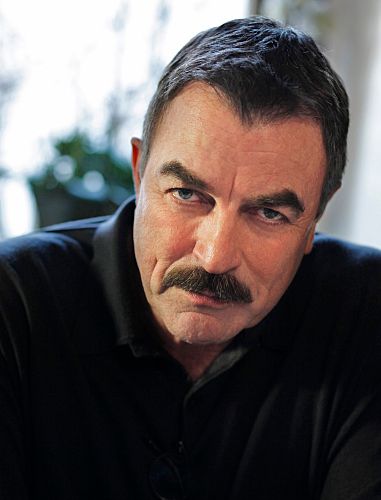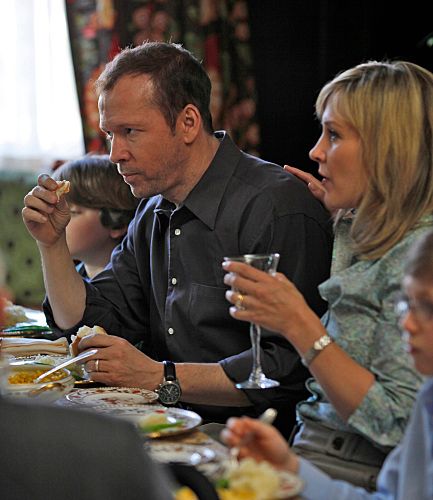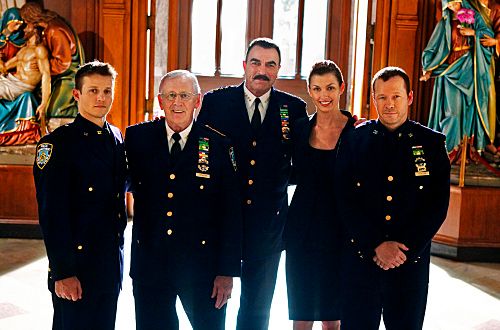The new CBS drama Blue Bloods follows a multi-generational family of cops dedicated to New York City law enforcement. As the Police Commissioner, Frank Reagan (Tom Selleck) runs his department as diplomatically as he runs his family, which consists of a seasoned detective son (Donnie Wahlberg), an Assistant D.A. daughter (Bridget Moynahan) and the youngest (Will Estes), who has decided to give up a lucrative future in law to become a cop.
During a recent interview, show star Tom Selleck talked about taking on another weekly series, working with such a strong ensemble, and the impact that Magnum P.I. had on his life and career. Check out what he had to say after the jump:
Question: You’ve said in the past that, to go into another weekly series, with your family considerations, it had to be just the right thing. What made this the right thing?
Tom: It was good, number one. Number two, it was an ensemble that clearly was going to require talented actors. Having done a lead, as I did in Magnum, being in every shot, I know it’s a tough road. Magnum was never canceled. I left it after eight years because I was tired from it, not tired of it. It’s always been a consideration, but this really just seemed to fit perfect. The script was terrific. The idea that it was going to shoot in New York caused a family consideration, but it was too good to pass up.
Will you bring your entire family to New York for this?
Tom: No. It’s an ensemble show. I’ll probably spend about half my time in New York City. I don’t mind the commute. I love my ranch and that lifestyle, but I love work. I have a mortgage, so it works out really well.
You lived in Hawaii for eight years with Magnum and now you’re in New York for Blue
Bloods. Is there something that challenges you about being pulled out of your comfort zone?
Tom: No. It was the biggest hurdle for me to accept the idea of doing the show. The first question out of my mouth was, “Where are you shooting it?,” and then we tried to discuss how that would work. It never works the way you plan it, but that wasn’t the attraction of it. It’s really hard to argue that this isn’t a better show, shot on the streets of New York. That excited me.
Have you just always been an actor who is comfortable living and working someplace else?
Tom: I’m kind of used to that. I’m not allowed to shoot in Los Angeles very often. The Jesse Stone films are done in Halifax, and we’ll be doing more of those. Number seven is ready to go. It’s called “Innocents Lost.” I made it real clear that I wasn’t going to give up Jesse, so we’re writing number eight.
What can you say about the background of this character and how he got to where he is?
Tom: He is the Police Commissioner. He came up through ranks and was a beat cop and, as a matter of leadership, he prefers to wear his Chief’s uniform. I think it’s very important for this character, who I’m still finding out a lot about, to wear the uniform. The Commissioner doesn’t always do that, but this one does. He evolved into the Commissioner. What I’m really trying to show, because that’s all history, is where he came from. He’s as blue collar as the rest of the family. He’s probably learned to be a little more diplomatic than maybe Donnie’s character is, but he has the same temper, and we’ll probably see that soon.
Did you have a say in who was cast around you?
Tom: I didn’t have any official say, whatsoever, but they were nice enough to mention people to me. I have no objection to this fine group of actors that we’ve got. With Jesse Stone, I wear a lot more hats. With this, I’ve got about one hat, maybe one and a half hats, because I’m older.
Do you feel a sense of mentorship on this show?
Tom: I don’t know. This is the first time I’ve played dad to grown-ups. I felt a little intimidated. I had such a good dad. Maybe I’m drawing from that, but I’m still getting used to that. I see my fellow actors and I’m way older than some of them. I don’t feel that much older, so I’m just getting used to the idea of playing a parent to grown-up kids. It’s a real interesting challenge for me. I’ve played a father to teenagers, kids and babies, so it’s a new thing for me, and I like that challenge.
Do the dinner table conversations on the show reflect your own thoughts?
Tom: I think they will, as time goes on. Right now, they know the characters better than we do. I think the dinner scene will be pretty much a set piece that, after you establish all the conflicts and how the case, or multiple cases, affects each member of the family, they’re going to converge on a Sunday dinner which isn’t always civil. Most people remember dinners with family. I certainly do.
Might you have to express the opposite point of view from your own?
Tom: Oh, absolutely. You don’t do characters that are the same as you, otherwise why bother to act? He’ll have different opinions than me, but that’s okay. I’m playing a character on a show and it’s fun to get inside the skin of these people. If you do it right, you’ve got to root for these people. They’re all going to have problems and flaws, which is why they’re good writers. They give us things. The audience will root for this family and the conflicts within the family. It’s an adult family drama. It’s not for kids. They can watch it, but it’s not geared toward them. It’s not Little House on the Prairie, which I did like watching with my little daughter.
How has TV drama changed in the last 30 years?
Tom: I think television has always been one to replicate when something’s successful. I don’t think there’s quite as much innovation. Innovation sometimes seems to be a gimmick, nowadays. Nobody in our shows can see through walls, or anything. They’re just people. That’s so much a part of basic drama that it’s almost new. We’re going to look a little different. While everybody here is probably old enough to understand that, it’s not always where television’s at. And, I hate reality shows.
Something like Blue Bloods would not have been on in the ‘80s, wouldn’t you agree?
Tom: I don’t think so. It would’ve been more of a soap opera. Television’s grown up a lot. It’s a little more adult, which I think is a good thing. It allows actors to tell more complex stories. I’m happy to see where it ends up.
Is there a different you coming out in this?
Tom: I don’t know yet. You get no time to prepare doing a pilot. I had a little more time than most. I had a couple of weeks, but no background. I’m doing all my background now. It’s all pretty new. You don’t really need to know where it’s going. That makes it work better.
How do you feel about the show being on Friday night?
Tom: If it’s good, people will probably watch. Thursday nights were one of the lowest-viewing nights of the week when Magnum started, so that was a good lesson for me. It’s out of our hands anyway. I’m just delighted to be on the air.
How much of a relief is it for you to only have to wear one hat, at this point?
Tom: It’s a matter of knowing my place. At the same time, I get ideas, so it’s important to establish a working relationship. I’ve learned things, an executive producer and as a writer of a series, which is what Jesse Stone is now, but I’m pretty good at wearing the correct hat. I’ve seen people throw their weight around too much, for most of my life in this business, and I want to make sure I don’t do that. This is an ensemble piece with four roles. I certainly see it as equals.
Do the successful DVD sales for the Jesse Stone films help you to keep making them?
Tom: We’ve always sold well on DVD. That’s why Sony is such a good deficit partner and that’s why we can afford to do the movies because they’re pretty expensive. I don’t find them old-fashioned. I find them film noir-ish, which is what we’re paying homage to. Our whole philosophy, and CBS embraced it, was basically to make a movie-of-the-week look like a feature film, and tell stories that way. It’s paid off for us.
You’ve had frustration in getting a Magnum P.I. movie made, haven’t you?
Tom: I had frustration. I had Tom Clancy on board, who was a huge Magnum fan, and Universal, at the time, who were the only people who could do it. That was mid-‘90s. We went through three owners and each one had to reinvent it, and then it went away. I keep hearing talk of it now, but I think I got a dilemma. I don’t think they want me in it, but everybody sees me in it, from the response I get. They’ll either make it or they won’t. I just hope that, if they make it, they pay homage to it, and not trivialize it and make fun of it, like they do in so many television remakes. The Magnum audience is very loyal. It’s in the Smithsonian. I would compare it a little more to Star Trek than I would some of the other shows that they’ve trivialized.
Where would Magnum be today?
Tom: I know where he’d be. He went back in the Navy, at the end of Magnum. He was a very good officer, but what’s going to happen because he left the Navy for eight years is that he’s not going to make the next rank in time because he was way behind the curve. He’s going to have to leave and he’s probably going to go back to Hawaii. I don’t want to tell you anymore.
Would you be upset if they recast it?
Tom: I think they probably will, if they do.
Don’t you think you could still be a viable Magnum?
Tom: If he’s going to be a 17-year-old pubescent youth, I can’t play him. It’s weird with audiences. They know you’re not the character, but they think these characters live. What they want to know is, where is he now? What happened while we’ve been away? That’s where a good movie should start. It shouldn’t be a reunion show, so everybody can tune in to see how everybody’s aged. I don’t want to do that.
Does it seem like an eternity ago?
Tom: It seems like a long time ago. The thing you miss about a series is the family aspect of the crew, a regular job and playing a character, over time, that is allowed to grow and change. I have that with Jesse Stone on a little more civil basis, in terms of work hours. But, I’m looking forward to Blue Bloods for the same reason. I have real fond memories from Magnum. I lived up to my contract and then some. I don’t regret leaving, but Magnum could’ve gone on for about 15 years. We were doing awfully good when we left.
Do you resist wearing Hawaiian shirts, at this point?
Tom: It’s a bit like wearing a flag.
What do you remember from initially selling the show to people?
Tom: I don’t know. Magnum was a show that was taken very seriously. I’m most proud of the fact that Magnum is in the Smithsonian. They recognized it as the first show that recognized Vietnam veterans in a positive light, and that’s why my Detroit hat and my Hawaiian shirt is next to Archie Bunker’s chair.
What did you think Magnum was going to be when it started?
Tom: Thirteen paychecks. We were picked up, and that was the best thing that ever happened. I didn’t know past that. It almost didn’t go because CBS got in a fight with Universal. Universal said, “We’re not shooting it in Hawaii,” and CBS said, “We bought a show for Hawaii.” It was off the schedule after it sold, so it was a bit of a roller-coaster for awhile. Then, I went over there to start it and the Screen Actors Guild went on strike. I was stuck with a rent I couldn’t afford and worked for my landlady for seven bucks and hour, so I didn’t have to give up my security deposit until the show actually started.
Is that when you almost got the Indiana Jones role?
Tom: Yeah, I couldn’t do it. Bob Daly wouldn’t let me do it. I got offered Indiana Jones, after I did the pilot. While it turned out I could’ve done both, CBS said, “No, we’ve got a contract.”
Was that disappointing?
Tom: Yeah.
More disappointing when you saw the box office?
Tom: No. Steven [Spielberg] and George [Lucas] let me read the script. Up until then, I was pretty philosophic because I thought Magnum was probably going to sell and I told them that. They said, “We’re not worried about that. We’ve got cards to play with the network.” I screen-tested without seeing the script, and they let me go into an office when they made me the offer, so that I could read the script. I went, “Oh, my God!” because it was all there. It was on paper. They held out the offer for about a month. Harrison gets sick of this because he’s indelible. He’s Indiana Jones. It’s just an interesting story and I’m proud that I didn’t drive my car into a wall. I lived up to my contract and things didn’t work out so badly.

